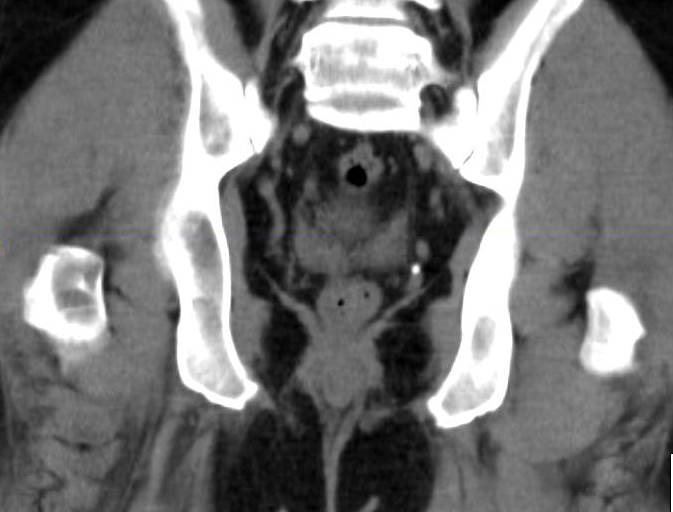
October 1, 2013 — Patients receiving radiotherapy (RT) for cancers in the pelvic region can experience diarrhea, a negative side effect of radiation treatment. Sulfasalazine, an oral tablet used to treat inflammation of the bowels, had been shown in a past trial of 31 patients to decrease diarrhea during pelvic RT. Sulfasalazine does not reduce diarrhea, according to research presented at the American Society of Radiation Oncology’s (ASTRO’s) 55th Annual Meeting. The study also determined that the medication might be associated with a higher risk of diarrhea than placebo.
The multi-institutional phase III trial was conducted through the Alliance for Clinical Trials in Oncology (NCCTG/CALGB/ACOSOG) to evaluate the effectiveness of sulfasalazine versus placebo in the treatment of enteritis (inflammation of the intestinal tract) during pelvic RT (> 45 Gy). A total of 87 patients, with 78 patients evaluable for the primary endpoint and with evenly distributed baseline factors, were enrolled in the study at 24 institutions in the United States from 2011 until 2013. The patients received 1,000 mg sulfasalazine or placebo orally, twice each day during RT and for four weeks after RT. The primary endpoint was maximal severity of diarrhea during and up to six weeks after RT. On a weekly basis, a health care provider graded the maximum severity and the duration of maximum severity of diarrhea, rectal bleeding, abdominal cramping, tenesmus (a sensation of incomplete defecation) and constipation. Patients completed bowel function questionnaires weekly during RT treatment, afterwards for six weeks and at 12 and 24 months post-RT. A two-sided Wilcoxon rank-sum test was used to test the equality of the distributions of maximum diarrhea severity grades.
An interim analysis of the study revealed a statistically significant excess of grade ? 3 diarrhea (passing seven or more stools per day) in patients receiving sulfasalazine versus placebo (29 percent versus 11 percent, p=0.037). The study was halted in May 2013 when it was determined that it was unlikely for the sulfasalazine to indicate beneficial results.
“Although 2001 research had suggested a benefit for sulfasalazine, we were very surprised to find that patients receiving sulfasalazine experienced worse diarrhea than those receiving placebo,” said Robert C. Miller, M.D., M.S., lead author of the study, a professor of radiation oncology at the Mayo Medical School and vice chairman of research in the department of radiation oncology at the Mayo Clinic in Rochester, Minn. “For the prevention of radiotherapy-related diarrhea, we now know that sulfasalazine will not benefit patients. This trial clearly illustrates the necessity for large, phase III, randomized controlled trials to understand which drugs and therapies will relieve the more negative side effects for patients receiving radiation therapy.”
For more information: www.astro.org


 January 30, 2026
January 30, 2026 









